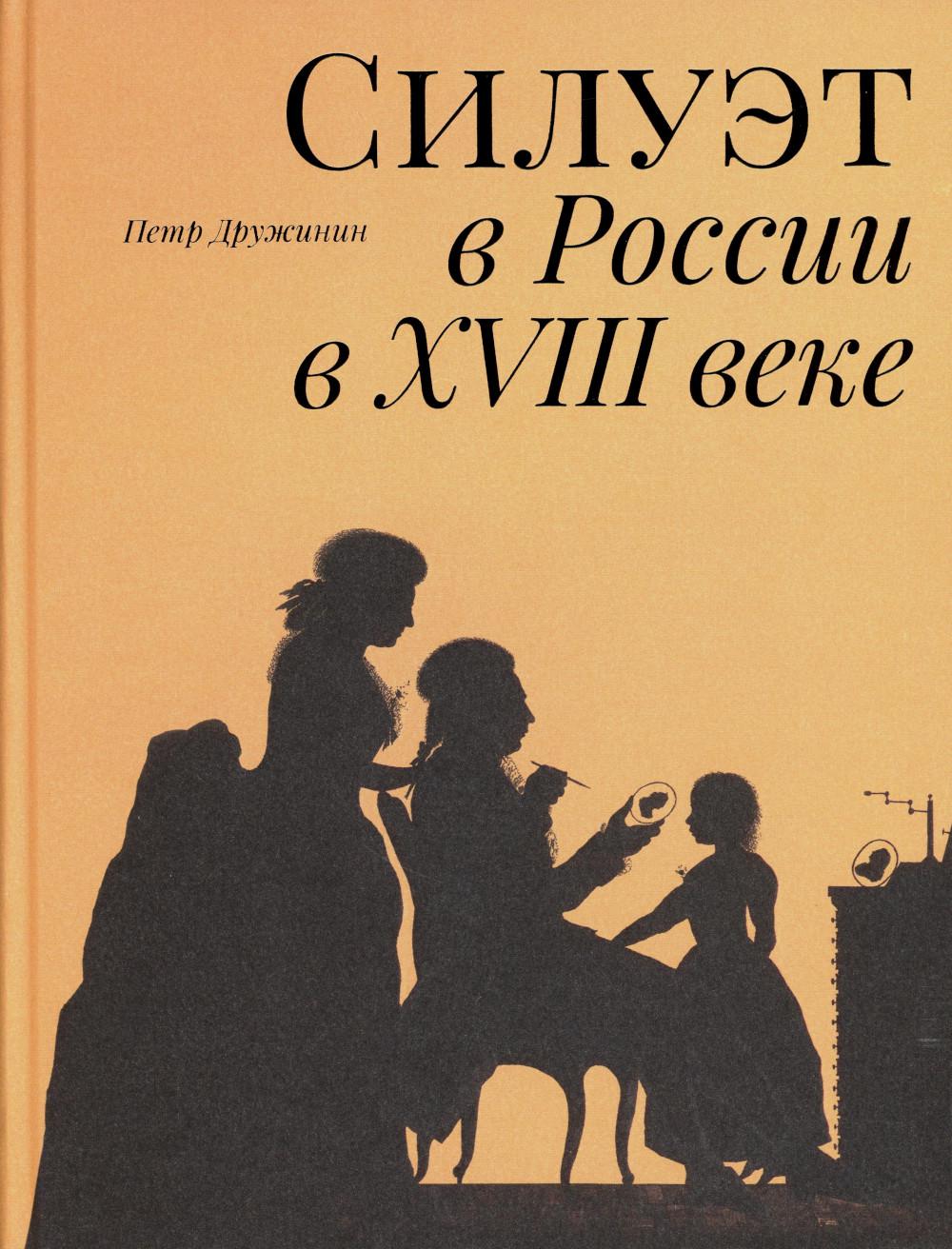Книга историка, старшего научного сотрудника Института русского языка имени В. В. Виноградова Российской академии наук Петра Дружинина посвящена портретному силуэту — уникальной иконографической технике, получившей невиданное распространение в Европе в последней трети XVIII века. Россия была не просто подражателем общеевропейской моды, но стала центром притяжения лучших художников жанра, странствующих мастеров со всего света. Именно Россия в XVIII веке пережила подлинный расцвет силуэтного портрета — выразительного, схожего, доступного, но вместе с тем крайне уязвимого для времени и ныне совершенно забытого. Собранный автором комплекс ранее неизвестных документов по истории русского силуэтного искусства уникален и многократно превышает всё когда-либо опубликованное по этой теме. Иллюстрации, которые дают возможность проследить эволюцию силуэта не только в России, но и в Европе, собраны с исключительной полнотой из более чем пятидесяти хранилищ России и мира, от Эрмитажа до Метрополитен-музея, причем многие публикуются впервые.Издание адресовано всем интересующимся историей русской и мировой культуры.This book is dedicated to the silhouette portrait — a unique representation technique, widespread in Europe and the United Kingdom in the last third of the 18th century. Russia not only followed and imitated European fashions, but also attracted the best representatives of the genre, who made this art form truly international by travelling around. It was thanks to eminent silhouette masters like Sideau and Anthing, whose art conquered Russia in the 1780s, that the genre flourished there. The silhouette portrait is very expressive, affordable and provides a good likeness, but also time-sensitive and now almost completely forgotten. Over several decades the author, historian Dr Peter Druzhinin, has collected a substantial body of previously unknown documents on the history of the silhouette portrait, a collection which is unique and entirely supersedes and previous publications. New information has been obtained mainly from European and Russian archives, as well as from a thorough combing of Russian and northern European press material. The book contains detailed biographies of Russian silhouette artists during Catherine the Great and Emperor Paul I of Russia times, as well as, in its last chapter, a dictionary of artists who either worked in Russia or came to Russia in search of an income. It is worth mentioning that many of these names are absent from other dictionaries of artists and are mentioned for the first time in the context of art history. The publication includes over 400 illustrations collected from over 50 museums and libraries fin Russia and all over the world, ranging from the Hermitage to the Metropolitan Museum of Art. These illustrations will give the reader an opportunity to see the evolution of the silhouette portrait in Russia and in Europe. Many of them are published for the first time including portraits of prominent European writers, scientists and artists from Anthing travel journals, previously thought to be lost.
Сумма:
Оформить
Вход
- Вход
- Регистрация
- Восстановить
Личные данные
Здесь Вы можете указать/изменить личные данные для максимально комфортного взаимодействия с магазином.
ДАТА ЗАКАЗОВ
20/01/2025-24/01/2025/
Наличие книг на складе или в магазине просьба уточнять согласно Договору оферты
Каталог
-
В наличии
- Уценка
- Издательства
- Архитектура
- Буддизм
- Востоковедение
- Детская
- Дом
- Детская психология
- Иудаика
- Зарубежная литература
- Искусство
- История
- Йога
- Кино
- Комиксы
- Детективы
- Лингвистика
- Медицина
- Мемуары
- Методическая
- Мода
- Музыка
- Наука
- Отношения
- Подарочные издания
- Поэзия
- Программирование
- Психология
- Религиоведение
- Русская литература
- Спорт
- Таро
- Традиционализм
- Фантастика
- Философия
- Фотография
- Эзотерика
- Языки
- Новинки
-
Художественная литература
- Классическая и современная проза
- Авангардная поэзия и проза
- Афоризмы, цитаты, притчи
- Биографии. Мемуары
- Военная тематика
- Молодежная литература
- Детективы. Боевики. Триллеры
- Исторические романы. Приключения
- Кинороманы
- Комиксы. Манга
- Клуб семейного досуга
- Литература на иностранных языках
- Любовные романы
- Медицинская тематика
- Поэзия
- Эссе
- Фантастика. Фэнтези. Мистика
- Юмор. Сатира
- Издательства
- На беларускай мове
- Психология
- Эзотерика
- Философия. Социология
- Бестселлеры
- Любимые серии
- Уценка
-
История
- Азбуковник
- Алгоритм
- Александрия
- Алетейя
- Вече
- Возвращение
- Дмитрий Буланин
- Европейский Университет
- Историческая иллюстрация
- Евразия
- Новый Хронограф
- Нестор-История
- Квадрига
- Принципиум
- Коло
- Русский Путь
- Традиция
- Товарищество научных изданий КМК
- Русская панорама
- РОССПЭН
- Центрполиграф
- Грифон
- Яуза
- Quadrivium
- Paulsen
- Пятый Рим
- ExNord
- Университет Дмитрия Пожарского
- Росток
- TATLIN
- Кучково поле
- Русские витязи
-
Деловая литература
- MBA. Бизнес-курс
- Бухгалтерия. Налоги. Аудит
- Деловая литература. Право. Психология
- Кадры. Офис. Делопроизводство
- Маркетинг. Реклама
- Менеджмент
- Предпринимательство. Отраслевой бизнес
- Торговля. Логистика
- Финансы. Банковское дело. Инвестиции
- Экономика
- Издательство ДМК
- УРСС Наука, образование, юриспруденция
- Манн, Иванов и Фербер
- Детям и родителям
- Учебная литература
-
Искусство. Культура
- ИСКУССТВО - XXI ВЕК
- Слово
- Arca Publishers
- Альбомы по искусству. Фотоальбомы
- Архитектура. Градостроительство
- Изобразительное искусство
- Искусствоведение. История искусств
- Кино. Киноискусство
- Культура. Культурология
- Музеи, коллекции и собрания
- Музыка. Музыкальное искусство
- Танец. Балет. Хореография
- Театр. Сценическое искусство
- Фотоискусство. Художественная фотография
- Цирк. Цирковое искусство
- Сеанс
-
Компьютерная литература
- MS Office. Офисные программы Майкрософт
- Базы данных
- Графика, дизайн, мультимедиа
- Интернет и Web-страницы
- Компьютерная безопасность. Хакерство
- Компьютерные сети
- Компьютеры и программы
- Операционные системы (Windows, Linux...)
- Разработка программного обеспечения
- Системы проектирования (CAD/CAM)
- Языки и системы программирования
- Программное обеспечение
- Основы информатики, общие работы
- ДМК-пресс
-
Медицинская литература
- Внутренние болезни
- Гинекология. Урология. Акушерство
- Диагностика. Методы и виды
- Инфекционные болезни
- История медицины
- Кожные и венерические болезни. Дерматовенерология
- ЛОР. Оториноларингология
- Медико-биологические дисциплины
- Наркология. Алкоголизм. Табакокурение
- Неврология. Нервная система
- Неотложная помощь. Терапии
- Онкология. Опухоли
- Офтальмология. Расстройства зрения. Очки
- Педиатрия
- Популярная и нетрадиционная медицина
- Психиатрия. Психопатология. Сексопатология
- Система здравоохранения
- Сомнология
- Стоматология
- Фармакология. Рецептура. Токсикология
- Хирургия
- ГЭОТАР-Медиа
- Нехудожественная литература
-
Гуманитарные издательства
- Академический проект
- Альма Матер
- Альпина
- Аспект-Пресс
- ББИ
- Водолей
- Геликон
- Гилея
- Гнозис
- Гуманитарный центр
- ИМЛИ РАН
- Индивидуум
- Книжники
- Лабиринт
- Ладомир
- Летний сад
- МИФ
- Мосты культуры / Гешарим
- Наука-М
- Наука-СПб
- Никея
- НЛО
- Новое издательство
- ОГИ
- Опустошитель
- Петрополис
- Питер
- Проспект
- Портал
- ПСТГУ
- РГГУ
- Рипол
- Русский Гуливер
- РХГА
- Сибирская Благозвонница
- СПбГУ
- ЦГИ
- Ad Marginem
- CHAOSSS/PRESS
- Common place
- Hyle Press
- Jaromir Hladik press
- Rosebud PubIishing
- V-A-C press
- Книги прочих издательств
- Под заказ
- Прочие товары
- Домашний круг
- МАНН, ИВАНОВ И ФЕРБЕР



